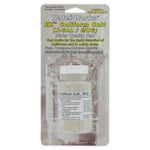Now before you freak out, keep in mind that the presence of fecal coliform bacteria in a body of water does not necessarily mean the water will cause a person to get sick… or die. Also, this sampling included, for the most part, outside bodies of water, not drinking water supplies.
So having said that, why should residents in that area care if ponds, streams, rivers, lakes, etc. contain fecal coliform bacteria? Simple: The presence of such a contaminant serves as a warning flag that somehow, in some way, sewer and septic systems have failed to contain human waste… and it has found a way to seep into the environment untreated.
If enough untreated sewage finds its way into the environment, a good chance exists that it may one day also find its way to a popular swimming hole in a local creek, drift around until it lingers just off the shore of a lake where people wade to cool off, and possibly even seep down into the ground where it could enter an aquifer that provides water to wells servicing the homes of unsuspecting families.
Officials in Augusta have broadened their examination of water downtown after an Augusta Chronicle analysis found elevated levels of fecal coliform bacteria.
The sampling began Monday after the newspaper published a report Sunday revealing the results of water sample testing from 50 locations in Richmond, Columbia and Aiken counties.
Fecal coliform bacteria indicates that pathogens may be present and could pose a risk to human health.
Garrett Weiss, manager of the Augusta Engineering Department’s Stormwater and Environmental Section, says his department has been aware of some of the problems and is moving to correct them.
He said old, hidden sewer lines that aren’t properly hooked up to sanitary sewer systems may be to blame for the high levels. ( source )
I you or someone you know has reason to suspect contamination of their water supply with coliform bacteria or any other potentially harmful chemical element, compound, or organism, seek the assistance of a certified water testing laboratory in your area. If no labs exist in your immediate area, or they have extremely high testing rates, contact your local health department or take a look at the water testing services offered by companies like National Testing Laboratories.






